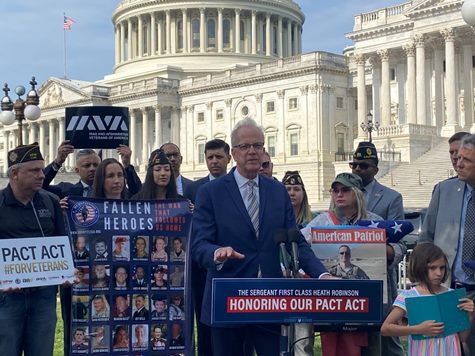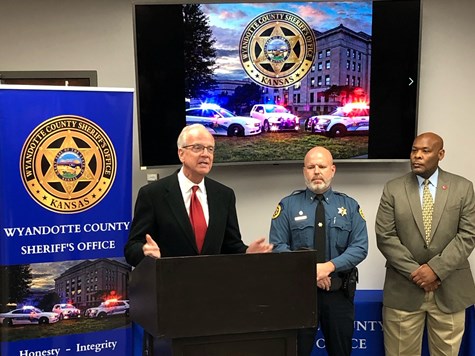U.S. House prepaing to act on mammoth budget legislation ahead of deadline
by Tim Carpenter, Kansas Reflector
Topeka — U.S. Sen. Roger Marshall voted against the $1.7 trillion spending bill awaiting action by the U.S. House because it expanded the federal deficit and fueled inflation with wasteful spending.
Marshall said the measure unwisely delivered $370 billion in handouts to clean energy, $47 billion in military, economic and humanitarian aid for Ukraine, $3.2 billion for processing illegal immigrants and $1.7 billion to enforce regulations eroding 2nd Amendment rights.
The Kansas Republican also objected to $212 million for the U.S. Department of Justice to advance prosecution of defendants and investigate cases tied to the assault on the U.S. Capitol in January 2021. The package would overhaul the 135-year-old law former President Donald Trump and his allies sought to exploit in an effort to stop the certification of the 2020 election.
Marshall’s criticism extended to congressional earmarks filling more than 4,000 pages of the bill, including spending for LGBTQ organizations. Overall, the legislation funded 7,200 earmarks valued at $15 billion.
“We are going to borrow another trillion dollars from our grandchildren,” Marshall said. “America is going to continue to print this money, the feds can keep raising interest rates, but they are just a tiger chasing its tail.”
Marshall split on the bill Thursday with Republican U.S. Sen. Jerry Moran, also of Kansas. The U.S. Senate voted 68-29 to forward the bipartisan legislation to the U.S. House.
Moran backed the bill likely to be adopted by the U.S. House before the Friday deadline and quickly signed by President Joe Biden, but denounced the process of bundling what ought to be a dozen separate appropriations bill.
“I certainly decry the method by which the committee, the Senate, the Congress work in regard to appropriations bills. There is no reason — none — that we could not do as we are supposed to do,” Moran said. “We’d all be better off if we broke this down into 12 separate parts that are now combined into this one large bill. We’d know much more about it.”
U.S. Rep. Tracey Mann, who serves the 1st District covering much of western Kansas, said it was wrong for Democrats to push through an omnibus spending bill during the lame-duck period between the November election and the January transition to GOP leadership in the House.
“This is bad legislation passed in a dishonest, untimely way,” Mann said. “While Washington Democrats had control of the House, it was their responsibility to pass normal spending bills. They never got their act together, so now we are stuck with this omnibus — a 4,155-page spending bill put together behind closed doors and with no input or oversight from House Republicans.”
He said manner in which this budget legislation was handled demonstrated why Republicans were able to take back control of the U.S. House.
The package funding the federal government through September included $850 billion in defense spending, which would equate to a 10% increase over the previous fiscal year, and $770 billion in nondefense spending for an 8% boost.
The appropriations package offered more than $15 million for the construction of new U.S. Army barracks at Fort Riley, which serves the 1st Infantry Division.
“Already home to nearly 15,000 active duty service members and the headquarters for the 1st Infantry Division, Fort Riley will soon have the opportunity to expand its capabilities,” Moran said. “By building new barracks, the base will have greater capacity for additional soldiers to be housed at Fort Riley and will be in a better position to compete for future opportunities.”
He applauded inclusion in the bill improvements in funding of health care and mental health services for U.S. veterans named in part for former U.S. Sen. Robert Dole, a Kansan seriously wounded during World War II in Italy.
“By closing the gaps in health care for rural veterans, protecting veterans’ right to seek care where they choose, investing in the treatment of prostate cancer, expanding homeless outreach programs and more, this legislation touches the lives of veterans in all different walks of life, from every corner of the country,” Moran said.
Kansas Reflector stories, www.kansasreflector.com, may be republished online or in print under Creative Commons license CC BY-NC-ND 4.0.
See more at https://kansasreflector.com/2022/12/23/kansans-marshall-moran-split-votes-in-u-s-senate-on-pending-1-7-trillion-federal-spending-bill/


